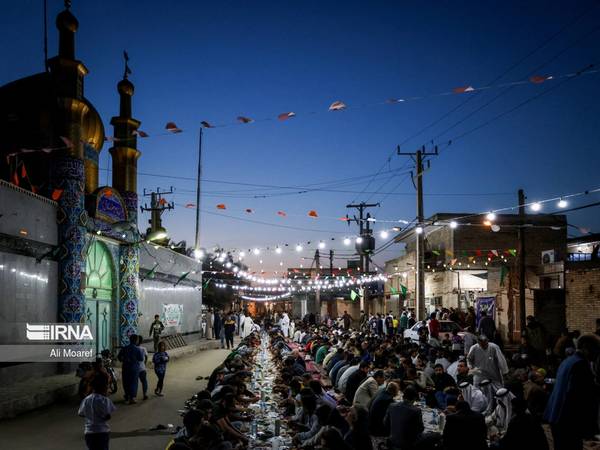Iranian social media this week was abuzz with controversy over Ramadan events organized by the government and its affiliated entities, where free food was distributed to attract larger crowds.
Government officials and its media outlets then used these events, including a gathering of around 80,000 in a sports stadium, to claim popularity, while offering free Ramadan Iftar food on the streets.
Authorities have not released any figures on the costs of street iftar events but Iran International’s sources say the municipality this year allocated 2.7 trillion rials (around $5m) for distribution of 200,000 meals in the capital at iftar for ten nights beginning March 20, the day of the Iranian New Year, Norouz, which has coincided with the fasting month this year.
Tehran Municipality has spent only a fraction of the budget it has allocated to iftar events on food and used the remaining on propaganda billboards, banners, and online advertisements to encourage people to participate.
Only 200 billion rials (around $370,000) was spent on the food, consisting of soup and other simple fare, with the remaining going to propaganda including renting 100 billboards, they say.
Tehran municipality also extensively advertised its plans for the preparation and distribution of a two-hundred-meter-long cake weighing two tons at Tehran’s Keshavarz Boulevard on the birthday of the second Shia imam, Imam Hassan.
Anti-regime activists and ordinary Iranians sharply criticized these events. Some claimed that the sports stadium was filled with bussing in people, including Afghans affiliated with the Fatemiyoun militia forces, their families and others affiliated with the regime.
This year’s iftar events are much larger than similar events in previous years.
The Islamic Propaganda Organization, for instance, held the iftar event hugely promoted by the state media for 150,000 at Tehran’s Azadi Stadium, which attracted the 80,000 crowd mentioned earlier. Authorities claim the costs were partly covered by donations.
Photos and videos published by the state media show many of the participants at the event waving flags of Palestine and Afghan Fatemiyoun Brigade born by its members and their families.
Fatemiyoun Brigade is a militia recruited by Iran’s Revolutionary Guards (IRGC) since 2014 from Shia Afghans living in Iran to fight in Syria alongside government forces.
With the huge decline of popular support, as seen from the unprecedented low turnout in the elections of the past few years and participation in government-sponsored rallies, authorities have made various attempts to encourage citizens, particularly the younger generation, to participate in religious and state-organized rallies.
In June 2022, only a few months before the Woman, Life, Freedom protests were ignited by the death of Mahsa (Jina) Amini in the custody of morality police, authorities gathered students at the same stadium to sing ‘Hello Commander’, a pop genre religious and ideological song seen by the public as praising Supreme Leader Ali Khamenei. Similar events were held across the country in the following days.
‘Hello Commander’ being performed at Isfahan’s Naghsh-e Jahan Square
The massive promotion of the song by government agencies, such as the education ministry was unusual as pop genre is often frowned upon and has no place on Iran’s state media.
“Holding simple iftar events is Supreme Leader’s wish, the spokesman of Tehran municipality told the media Sunday, adding that the municipality intends to organize more street events on “religious holidays and national and revolutionary occasions”.
He added that holding these events is “much more than a bowl of soup or a piece of cake and claimed that the idea is “creating an atmosphere of collective happiness among people.”
Even more than previous years, however, authorities have tried to prevent people from gathering to celebrate the much-cherished ancient New Year festival, Norouz, which has coincided with Ramadhan this year, even resorting to violence against participants in popular gatherings.
